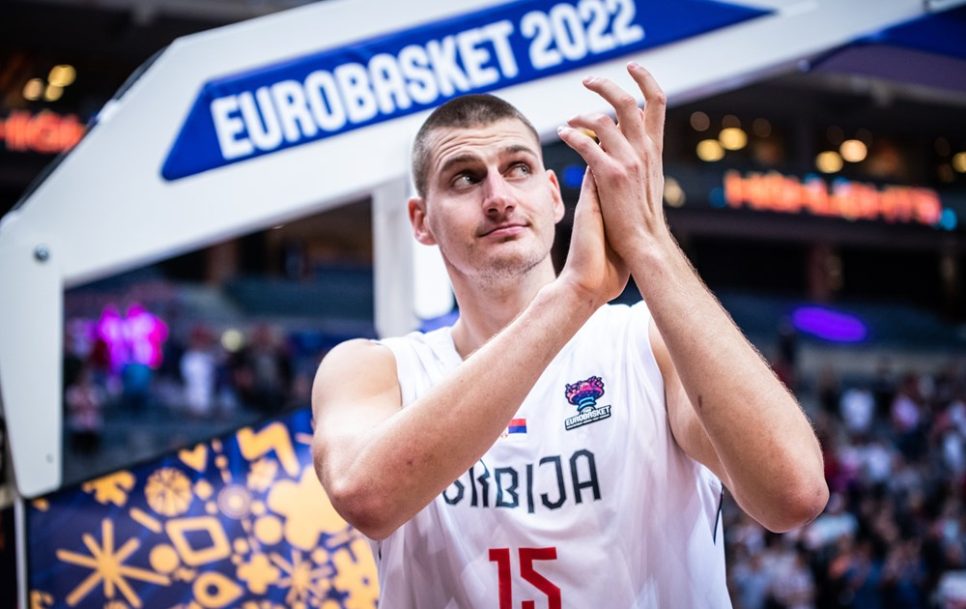No Jokić, no party? Serbia is still incredibly strong
The Serbian national basketball team has always been among the favorites to win medals in major tournaments, and the situation is no different before this year’s FIBA World Cup. Even as the Serbians start their bid on August 25th without arguably the world’s best player, Nikola Jokić.
Having worked hard to lift the Larry O’Brien trophy last season with the Denver Nuggets, Jokić is – quite understandably – taking some time off to rest, despite coach Svetislav Pešić (Serbian national team) and Bogdan Bogdanović (Atlanta Hawks) trying their best to get him on board.
The star center’s season ended only on June 13th, after playing a total of 89 games throughout the season and averaging a lengthy 39.4 minutes per game in the NBA playoffs. A mentally and physically demanding undertaking for even the toughest of players.
The absence of Vasilije Micić hasn’t made things easier for Serbia either. The two-time EuroLeague champion struggled with injuries last season and decided to finally try his luck in the NBA. The 196 cm tall guard teamed up with the Oklahoma City Thunder and now focuses on adapting to new teammates and preparing for his debut season in the dream league.
A solid starting lineup
The absence of these two key players raises the question of whether Serbia could drop out of contention for the medals. But that’s hardly the case as the talent in the Serbian basketball powerhouse runs deep. Of course, having Jokić and Micić would improve their chances, but even though both were present in last year’s EuroBasket, Serbia fell to Italy in the first round of the knockout stage. Names may sound impressive on paper, but they don’t guarantee success!
Looking at Serbia’s starting five for the World Cup, it’s a very solid lineup. Bogdanović will lead the team, averaging 14 points, 3.1 rebounds, and 2.8 assists per game last season with the Hawks. Notably, he shot with an impressive 40.6% accuracy from the three-point line.
Alongside him, EuroLeague star Marko Gudurić could shine. He had his best season in the EuroLeague, averaging 12.3 points, 3.2 assists, and 3 rebounds per game with Fenerbahçe. Gudurić and Bogdanović share some similarities, as both are most effective when handling the ball.
Ognjen Dobrić could possibly start at the third position, having emerged as one of the best defenders in the EuroLeague. A logical move to complement the offensive-minded Gudurić and Bogdanović.
In the post, things are fairly clear. The power forward spot belongs to Filip Petrušev, who had a breakthrough season in the EuroLeague and joined the NBA’s Philadelphia 76ers in the summer. Interestingly, Petrušev switched positions last season, moving from center to power forward and performing effectively.
No one displaces Nikola Milutinov from the starting center position. The 212 cm tall center, who now plays for Olympiacos, is one of Europe’s best in his position, excelling in rebounding and defense.
The lineup of Bogdanović, Gudurić, Dobrić, Petrušev, and Milutinov is capable of causing headaches for any opponent. This combination is well-balanced, featuring both defensive locks and excellent scorers. There are players who can take on one-on-one challenges and utilize screens effectively, with all except Milutinov being dangerous also from behind the three-point line.
The bench isn’t lacking quality either
A high-quality starting lineup is just one part of the formula for success. The team needs hard-working role players and guys who can take control of the offense when Bogdanović and Gudurić are having off days. EuroLeague fans are very familiar with the likes of Nemanja Nedović and Vanja Marinković who can put on spectacular shooting performances.
As for strong defense, Uroš Trifunović, Ognjen Jaramaz, and Aleksa Avramović are there to assist Dobrić. Aleksej Pokuševski and Alen Smailagić can provide much-needed resting minutes for the key players under the basket. So, no matter how you look at it, Serbia remains a formidable contender even without Jokić and Micić.
As strange as it might sound when speaking of a legend, Serbia’s potentially greatest weakness lies in its coaching staff. Yes, Pešić is a world and European champion, but his last gold medal was 21 years ago. Under Pešić’s leadership, Serbia finished a disappointing ninth in last year’s EuroBasket.
In the World Cup, Serbia is grouped with South Sudan, China, and Puerto Rico in Group B. Three victories should be almost an obligation for the European team.







